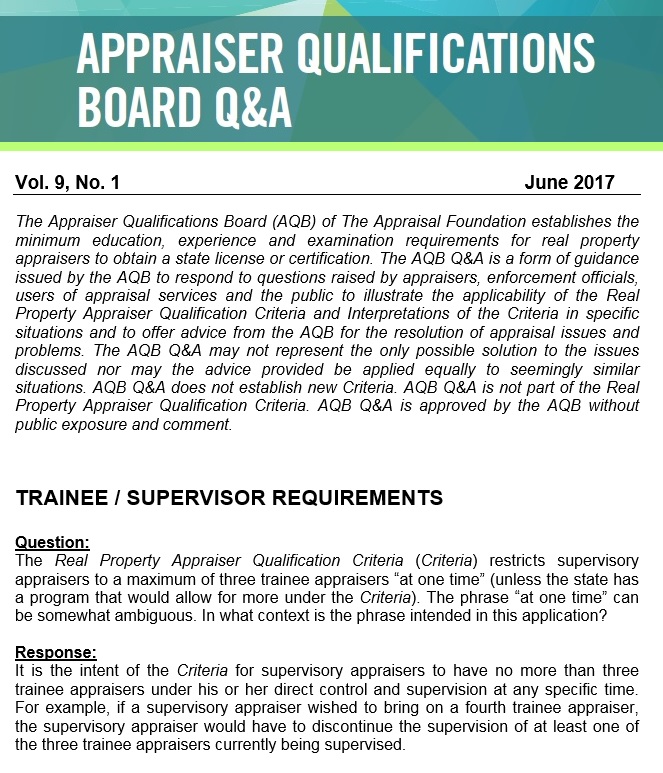
Appraiser Qualifications Board Q&As
June 2017 - Vol. 9, No. 1
The Appraiser Qualifications Board (AQB) of The Appraisal Foundation establishes the minimum education, experience and examination requirements for real property appraisers to obtain a state certification. The AQB Q&As are a form of guidance issued by the AQB to respond to questions raised by appraisers, enforcement officials, users of appraisal services and the public to illustrate the applicability of the Real Property Appraiser Qualification Criteria and Interpretations of the Criteria in specific situations and to offer advice from the AQB for the resolution of appraiser issues and problems. The AQB Q&As may not represent the only possible solution to the issues discussed nor may the advice provided be applied equally to seemingly similar situations. AQB Q&As do not establish new Criteria and is approved by the AQB without public exposure and comment.
The reader is advised that in all cases, the Q&As are based upon the minimum criteria adopted by the AQB. Individual states can adopt more stringent requirements. Please check with the state appraiser regulatory agency in your state to confirm their specific requirements.
For further information regarding AQB Q&As, please contact John Brenan, Director of Appraisal Issues at [email protected].
To download a PDF of the June 2017 Q&As, click here.

TRAINEE / SUPERVISOR REQUIREMENTS
Question:
The Real Property Appraiser Qualification Criteria (Criteria) restricts supervisory appraisers to a maximum of three trainee appraisers “at one time” (unless the state has a program that would allow for more under the Criteria). The phrase “at one time” can be somewhat ambiguous. In what context is the phrase intended in this application?
Response:
It is the intent of the Criteria for supervisory appraisers to have no more than three trainee appraisers under his or her direct control and supervision at any specific time. For example, if a supervisory appraiser wished to bring on a fourth trainee appraiser, the supervisory appraiser would have to discontinue the supervision of at least one of the three trainee appraisers currently being supervised.
It is not the intention of the Criteria for supervisory appraisers to “supervise” only on a daily, or assignment-by-assignment basis. Supervision is intended to be more long-term, and ongoing. However, there are appraisal firms that perform assignments for a wide variety of property types and intended uses, and may employ different appraisers who specialize in these differing property types. In such cases, it’s possible that the “lead appraiser” for a particular assignment might not be the trainee appraiser’s identified supervisory appraiser. This is permissible as long as the trainee appraiser continues to work under the overall supervision of the assigned supervisory appraiser, and the supervisory appraiser complies with the requirements set forth in the Criteria.
It’s important to remember that to be eligible for experience credit, the supervisory appraiser must sign the trainee appraiser’s USPAP-compliant appraisal report, taking full responsibility for its contents. In addition, if the trainee appraiser does not sign the appraisal report, the supervisory appraiser must identify the trainee appraiser in the appraisal report’s certification, and the tasks performed by the trainee must be stated within the appraisal report (as also required by USPAP).
The supervisory appraiser is also responsible, along with the trainee appraiser, to maintain a log of the trainee appraiser’s assignments as specified in the Criteria.
CONTINUING EDUCATION
Question:
I understand that to be eligible for continuing education to renew a real property appraiser credential, a course or seminar must be a minimum of two (2) hours in length. However, some courses include material that is not real property-related. For example, if one hour of a two-hour course were designed for personal property appraisers, would the course still be eligible for two hours of continuing education credit for real property appraisers? If not, would the course be eligible for one hour of credit for real property appraisers?
Response:
Only the real property appraisal-related portion of a continuing education offering is valid towards the renewal of a real property appraiser credential. In the example cited, the two-hour course would not be valid for two hours of continuing education credit, since it did not address real property appraisal-related topics for the entire two hours.
Further, this particular course would not be eligible for any real property appraiser continuing education credit, since the real property appraisal-related portion of the course did not constitute a minimum of two hours in duration. If, alternatively, a three-hour course included two hours devoted to real property appraisal-related topics, that course would be eligible for two hours of continuing education credit.